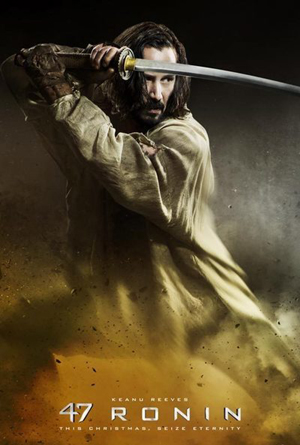 The story of the Forty-Seven Ronin is a very popular one in Japan, where it is known in its various forms as Chushingura. The historical events on which it is based took place at the beginning of the eighteenth century. Its latest incarnation is in the film 47 Ronin.
The story of the Forty-Seven Ronin is a very popular one in Japan, where it is known in its various forms as Chushingura. The historical events on which it is based took place at the beginning of the eighteenth century. Its latest incarnation is in the film 47 Ronin.
This version actually begins with the discovery and rescue of a boy lost in the forest (Keanu Reeves). Lord Asano (Min Tanaka) decides to take him in, even though his retainers are convinced the boy is a demon, raised by the tengu from which the forest takes its name. They take him home, clean him up, and name him Kai. He is pretty much an outcast, even when he kills a monster that has been ravaging the countryside – one of the samurai takes credit for the kill.
Asano, the lord of Ako, is to be honored by a visit from the shogun (Cary-Hiroyuki Tagawa), who will be accompanied by a neighboring and rival lord, Kira Yoshinaka (Tadanobu Asano). Asano is set up, essentially, through the efforts of a witch (Rinko Kikuchi): under the illusion that Lord Kira is assaulting his daughter, Mika (Kôu Shibasaki), Asano attacks Kira and tries to kill him. There is only one possible outcome: Asano is forced to commit seppuku. His men, led by Ôishi (Hiroyuki Sanada) are banished and forbidden to seek revenge. Kai, being a half-breed, is sold into slavery. Mika is consigned to the “protection” of Lord Kira; after her year of mourning, they will wed, uniting their two provinces.
Asano’s samurai, now ronin (masterless samurai), while on the surface acceding to the shogun’s judgment, are determined to avenge their lord: at stake is not only the honor of the house, but their own honor as samurai. Ôishi decides that they need Kai to fulfill their mission – he does seem to have some special abilities.
From the trailers, I figured 47 Ronin was going to be a historical chop-socky adventure story with monsters. It’s a bit more than that.
The story, while it wanders into the fanciful with the witch and the monsters she conjures (which, by the way, are solidly based on Japanese iconography), is fairly straightforward, give or take the tengu, who do give their aid, if unwillingly. It’s also fairly tight, if not particularly fast-paced: the action sequences are solid and well-executed, but though there is a lot of character development in between, the momentum doesn’t flag. Even the “supernatural” elements make sense in context: we are dealing with feudal Japan here, a social milieu in which roles and stations were pretty rigidly defined, and spirits are everywhere.
I was aware that the press on this film had been pretty negative, so I did something that I almost never do – I read a couple of the reviews. (After I saw the movie.) I suspect we’re dealing with a cultural gap here, and while I don’t claim to be an expert on the attitudes and psychology of the Japanese, I can claim some familiarity with Japanese history and culture.
Take the role of Kai as an example. Keanu Reeves, whatever you may think of him as an actor, is right on target here: Kai is an outcast, a half-breed, an orphan, a person of no family and no station, who lives, quite literally, by the sufferance of lord Asano. If this were a Western, he would be a trouble-maker, a rebel, and wind up leading the rebellion himself. In the context of feudal Japan, that simply is not possible: he would have been dead long before this story takes place. Reeves, I think, has it just right, the quiet, reserved demeanor, the downcast eyes, the reticence. What’s going on in his head stays there.
That, I think, is a clue as to what to look for in the rest of the cast, and it’s there: Ôishi comes across as arrogant, unsympathetic, even brutal to Western sensibilities, but in context, that is simply the product of the necessities of his station. Miko is the dutiful daughter – she has no other options, and even though we can see rebellion in her eyes, it stays there. Lord Kira is riding high, very pleased with himself, and again, arrogant and self-centered – but then, he is a Japanese daimyo and a favorite of the shogun. The characterizations all ring true, with the possible exception of the witch, but then, I’m never sure what a witch is supposed to be like.
Visually, the film is gorgeous. Quite aside from the richly dressed nobles and retainers, and several shots of sand gardens and other examples of beautiful landscapes, some of the panoramas and wide shots have the feel of scroll paintings.
I should note that, as the story winds to its inevitable conclusion, don’t expect a fairy-tale happy ending: the narrative won’t allow it. If you can deal with that, I think you’ll find 47 Ronin worth your time.
(H2F Entertainment/Mid-Atlantic Films/Moving Picture Company, 2013) Rated PG-13, running time 113 minutes. Full credits at IMDb.
